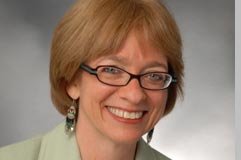Mazzoni Center will honor the first openly LGBT person to serve on the U. S. Equal Employment Opportunity Commission at its fifth annual Justice In Action fundraiser next month. The event, which raises funds and awareness for Mazzoni Center’s legal-services program, will be held from 11:30 a.m.-1:30 p.m. March 4 at the Loews Hotel Philadelphia, 1200 Market St. EEOC Commissioner Chai Feldblum will be the guest of honor at the event. Feldblum played an instrumental role in drafting the Americans with Disabilities Act and the Employment Nondiscrimination Act. She received her bachelor’s degree at Barnard College and her law degree at Harvard Law School. She has been a professor at the Georgetown University Law Center since 1991 and founded the Federal Legislation and Administrative Clinic at the law school. President Obama nominated Feldblum to serve on the EEOC, which enforces federal nondiscrimination law, in 2009 and she was confirmed by the Senate in 2010. Her first term as commissioner lasted until July and she was again nominated by Obama to serve her second term until July 2018. Feldblum grew up in New York City and was just 19 when she came out to her father in 1978. “I had come out to my father the previous fall as no longer being a religious Jew — and I can tell you, that was a much harder ‘coming-out’ experience for both him and me,” she said. Feldblum grew up in an Orthodox Jewish family, where she said she came from a long line of rabbis — including her grandfather, who was a Hasidic Rebbe in Philadelphia. Feldblum said family members accepted her from the start. Her father had hopes of her pursuing Talmudic studies, but after she decided to separate from the Orthodox identity, she chose to pursue a career in law. “I worked in various political jobs after college and I met lawyers who did amazing social-justice work,” she said. “Although I never knew any lawyers growing up, I decided that’s what I wanted to do.” Feldblum knew from an early age that she wanted to make a difference in the world for two communities to which she belongs. “I care about making the world a better place, which includes achieving full human and civil rights for LGBT people and people with disabilities,” she said, noting she was diagnosed years ago with an anxiety disorder. Feldblum said equality for the LGBT community and people with disabilities is part of the “overall fabric of human and civil rights.” “Equality on all bases — race, gender, religion, national origin, age, as well as disability, sexual orientation and gender identity — is essential. They all connect as the basis for a good society.” Feldblum worked to craft the ADA from 1988-90 while also working as legislative counsel at the American Civil Liberties Union AIDS Project. Feldblum said important partnerships arose during the effort to advance that measure. “Members of the AIDS community and the disability community got to know each other very well during that process, and both communities got to know members of the overall civil-rights community very well. Those collaborations have continued to this day.” In fact, Feldblum said the partnerships that were set during her work on ADA have helped fuel her work for ENDA, which saw a Senate victory in the fall. Feldblum said the success of ENDA now depends on the willingness of House leaders to bring the measure to a vote. Without ENDA, the EEOC cannot investigate discrimination based on sexual orientation and gender identity. But, Feldblum said, charges of LGBT discrimination have been brought to more than 50 EEOC offices around the country. “Our EEOC staff is investigating these charges to see if there is reasonable cause to believe that the federal law’s prohibition against discrimination on the basis of sex has been violated,” she said. “If our staff finds such cause, they will try to eliminate the alleged unlawful employment practice through methods of conciliation and persuasion with the employer.” The EEOC announced in April 2012 that it categorized discrimination against transgender people as a form of sex discrimination and that discrimination against LGB people could also be argued on the basis of sex discrimination. Feldblum said that if ENDA passes, the law could help solidify those protections. In order for the LGBT community to continue to garner full equality, a strong community foundation is needed — which is made possible by agencies like Mazzoni Center, Feldblum said. “LGBT centers, such as the Mazzoni Center, are key foundations for creating supportive and affirming communities,” she said. “I can’t imagine all of us doing all the hard work we need to do without having that community support behind us.” For more information on Justice In Action, visit www.mazzonicenter.org.
Newsletter Sign-up
